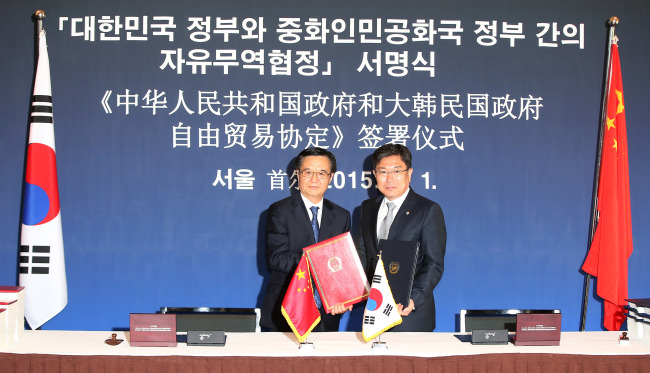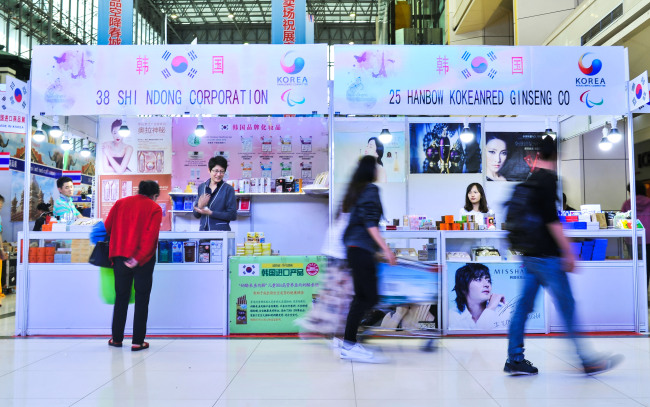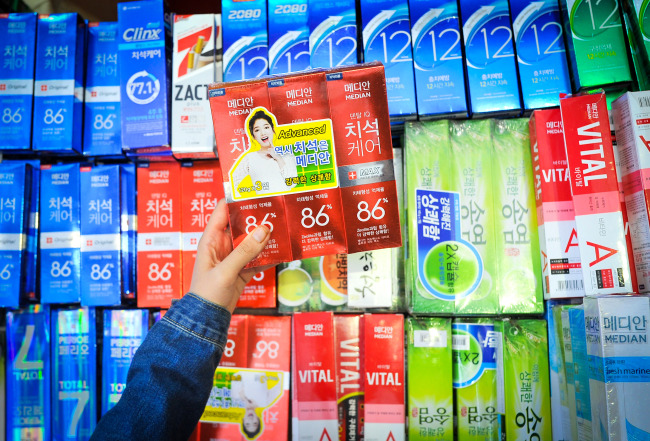South Korea’s National Assembly is expected to approve the free trade deal with China in the coming months, lawmakers and experts said, hinting that ratification would not take years as was the case in Seoul’s free trade agreement with Washington.
But disagreements between South Korea’s main parties over an array of other current affairs are expected to postpone talks over ratifying the Korea-China Free Trade Agreement, lawmakers said, suggesting that the deal would be ratified sometime after June.
“MERS and other current affairs top our priority list as of this moment. I haven’t heard any major discussion on the (Korea-China) free trade deal taking place right now,” main opposition New Politics Alliance for Democracy spokesperson Kim Sung-soo said Sunday.
Representatives of Beijing and Seoul approved the trade deal last November and gave their final blessings at a signing ceremony last Monday in Seoul, ending a decade of talks. Approval at Seoul’s unicameral legislature will seal the deal in South Korea.
But disagreements between South Korea’s main parties over an array of other current affairs are expected to postpone talks over ratifying the Korea-China Free Trade Agreement, lawmakers said, suggesting that the deal would be ratified sometime after June.
“MERS and other current affairs top our priority list as of this moment. I haven’t heard any major discussion on the (Korea-China) free trade deal taking place right now,” main opposition New Politics Alliance for Democracy spokesperson Kim Sung-soo said Sunday.
Representatives of Beijing and Seoul approved the trade deal last November and gave their final blessings at a signing ceremony last Monday in Seoul, ending a decade of talks. Approval at Seoul’s unicameral legislature will seal the deal in South Korea.

The NPAD conditionally supports the trade deal. The governing Saenuri Party is in full support.
South Korea’s main opposition party has vowed to OK the deal only if the government provides adequate subsidies to farmers and fishermen, the two interest groups likely to be hit the hardest as the FTA would allow China to export cheaper food products to Korea.
“We aren’t necessarily opposing the deal. It is our party line that we will examine the treaty to ensure there aren’t any unfair parts,” Kim said.
The NPAD confirmed last Thursday that it would form a panel to review the deal and decide whether to object it.
“I’m not sure about the specifics of the panel, but we will form the panel very soon,” said NPAD Rep. Shim Jae-kwon, the senior NPAD lawmaker on the parliament’s foreign affairs committee.
“But I also think that the legislature should form a separate panel to discuss this free trade deal, separate from the foreign affairs committee,” Shim said, apparently hinting that talks over the deal could take longer than expected in South Korea’s legislature.
The government vowed last Friday it would earmark 897 billion won ($797 million) for subsidies to the agricultural, fishing, dairy and forestry industries.
Ministry of Agriculture, Food and Rural Affairs officials expressed hope the funds would improve the quality of South Korean products, and give them an edge over China’s cheaper but lower-quality food producers.
The governing Saenuri Party supports the deal, echoing the Park Geun-hye administration’s view that the free trade agreement offers Korea a “second domestic market” that will improve the nation’s long-term economic prospects.
South Korea’s real gross domestic production will grow by as much as 0.96 percent, increase consumer benefits by $14.6 billion and create over 50,000 jobs in the next decade, Seoul’s Ministry of Trade, Industry, and Energy said last Monday.

The Saenuri Party’s 160-seat majority in the 298-seat Assembly ensures that it can bulldoze the trade deal through the parliament.
Although the NPAD could filibuster the treaty, Assembly Speaker Rep. Chung Ui-hwa also holds the right to veto the filibuster. Chung is a former ruling party lawmaker who, following typical customs, gave up his party membership after assuming the legislature’s top post last May.
The NPAD’s hold on the chairmanship of the parliament’s Legislation and Judiciary Committee also allows the party to stall the treaty from final voting.
NPAD Rep. Lee Sang-min, as the committee chair, can block bills from going to a final vote, unless a three-fifths majority at a related parliamentary panel overrules Lee’s veto. But the ruling party’s three-fifths majority at the foreign affairs committee means Saenuri officials can overrule Lee.
But most critical, local analysts point out, is that the main opposition party has no strong public support for opposing the China FTA.
“MERS and other affairs are at the head of public attention right now,” Hanshin University professor Yoon Pyung-joong said last Thursday.
“I don’t think the main opposition has the public support it needs to stall (the China FTA). And I don’t think the main opposition will have that in the future. The FTA will likely pass smoothly in the Assembly,” Yoon added.
Lee Gang-heoun, a former spokesman for dairy farmers who initially opposed Korea’s free trade deal with Australia, said that there was no strong opposition from farmers against the deal.
“We know that it’s inevitable. We just want the government to promise to give us enough support to continue our lives,” he said.

Trade between South Korea and China reached over $4.3 trillion last year according to the Korea International Trade Association. China is South Korea’s largest export market. Experts said China is likely seeking to address its trade deficit with Seoul through the free trade agreement.
The deal is also expected to further strengthen the bilateral strategic partnership between the two countries amid intensifying Sino-U.S. competition over regional influence in northeast Asia.
South Korea has 11 working FTAs including with the U.S., Australia, India and the EU. Its deal with Washington was the most contentious, sparking fierce opposition from farmers, some lawmakers and swathes of the public.
The Roh Moo-hyun administration signed the deal with the U.S. in 2007, but Seoul’s legislature gave its final nod in November 2011.
By Jeong Hunny (hj257@heraldcorp.com)
-
Articles by Korea Herald









![[Kim Seong-kon] Democracy and the future of South Korea](http://res.heraldm.com/phpwas/restmb_idxmake.php?idx=644&simg=/content/image/2024/04/16/20240416050802_0.jpg&u=)








![[KH Explains] Hyundai's full hybrid edge to pay off amid slow transition to pure EVs](http://res.heraldm.com/phpwas/restmb_idxmake.php?idx=652&simg=/content/image/2024/04/18/20240418050645_0.jpg&u=20240418181020)

![[Today’s K-pop] Zico drops snippet of collaboration with Jennie](http://res.heraldm.com/phpwas/restmb_idxmake.php?idx=642&simg=/content/image/2024/04/18/20240418050702_0.jpg&u=)